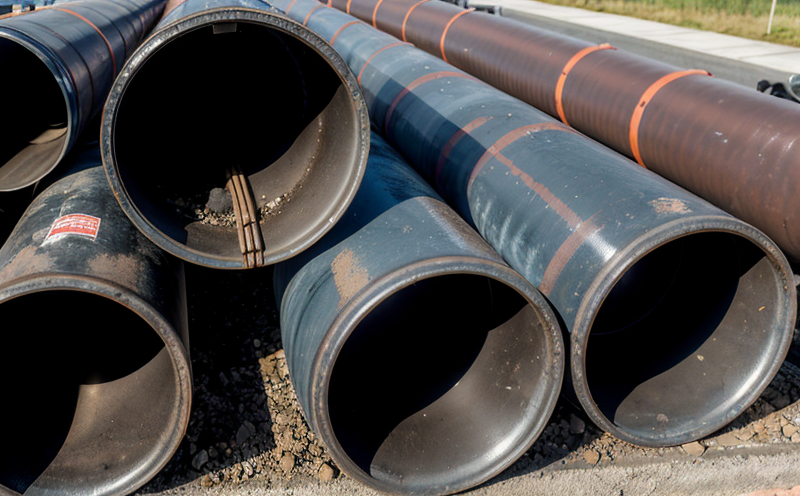JIS K 6731 Compressive Strength Testing of Plastic Pipes
The JIS K 6731 standard is a Japanese Industrial Standard that specifies the methods for determining the compressive strength of plastic pipes. This testing method is essential for quality assurance and compliance in various sectors, including plumbing, construction, and manufacturing.
Compressive strength testing involves applying axial force to a specimen until it fails or breaks under compression. The standard defines clear protocols on how to prepare samples, the equipment required, the test setup, and the calculation of compressive strength. Properly conducted tests ensure that plastic pipes meet safety standards, which is critical for their intended use in residential, commercial, and industrial applications.
The testing procedure typically involves selecting a representative sample from the batch of plastic pipes to be tested. The specimen should be cut to a standard length and diameter as specified by JIS K 6731. Specimen preparation is critical; any deviation can lead to inaccurate test results, which could impact the reliability and safety of the piping system.
The testing machine used for compressive strength tests must meet specific requirements outlined in the standard. The machine should have a capacity that exceeds the expected breaking load of the specimen by at least 50%. Additionally, the loading mechanism must be capable of applying force uniformly along the axis of the pipe without causing bending or shearing stresses.
Once the sample is securely mounted on the testing machine, the compressive force is gradually applied until failure. The machine records the load versus displacement data during the test. This information is used to calculate the compressive strength using the formula:
Compressive Strength = Load / Cross-sectional Area
The cross-sectional area of the pipe specimen must be accurately determined, which involves measuring its internal and external diameters.
The results from JIS K 6731 tests are crucial for quality control. They help manufacturers ensure that their products meet the required standards before they reach the market. For compliance officers, these tests provide a means to verify that suppliers deliver materials that adhere to industry regulations.
| Standard Name | Description |
|---|---|
| JIS K 6731 | Japanese Industrial Standard for Compressive Strength Testing of Plastic Pipes. |
| ISO 4593-2 | International Organization for Standardization standard for plastic pipes—determination of tensile strength and yield strength. |
The use of JIS K 6731 ensures that the testing method is consistent with international standards, which enhances the reliability and comparability of test results. This consistency is particularly important in sectors where global supply chains are involved or when dealing with imported products.
Applied Standards
| Standard Name | Description |
|---|---|
| JIS K 6731 | Japanese Industrial Standard for Compressive Strength Testing of Plastic Pipes. |
| ISO 4593-2 | International Organization for Standardization standard for plastic pipes—determination of tensile strength and yield strength. |
International Acceptance and Recognition
The JIS K 6731 standard is widely recognized in Japan, where it serves as the de facto method for determining compressive strength in plastic pipes. However, its influence extends beyond domestic markets. Many international companies operating in Japan or with Japanese clients often choose to comply with this standard due to its strict requirements and high reliability.
Several countries have adapted JIS K 6731 principles into their own standards, either directly incorporating it or using similar methodologies. For example, some European standards reference the concepts used in JIS K 6731 when specifying test procedures for plastic pipes.
The standard’s global recognition is further enhanced by its alignment with other international standards such as ISO 4593-2. This interoperability ensures that manufacturers and suppliers can easily transition between different markets without compromising the quality of their products.
Competitive Advantage and Market Impact
- Ensures compliance with industry standards, which builds trust among customers.
- Promotes product reliability by verifying that materials meet the required strength criteria.
- Facilitates easier market entry into Japan and other regions where JIS K 6731 is recognized.
The ability to perform accurate and consistent compressive strength tests according to JIS K 6731 provides a significant competitive advantage. It allows companies to demonstrate that their products meet the highest quality standards, thereby enhancing brand reputation and market competitiveness.





